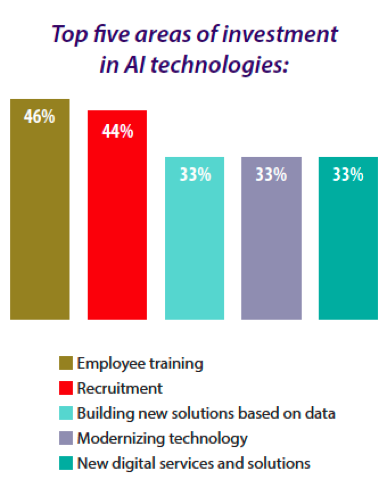3 Tips on Hiring in the Age of Artificial Intelligence

We are no longer on the brink of a changed world resulting from artificial intelligence (AI) — we are already immersed in that world. Today, software-driven machines are learning to process unstructured information in meaningful ways, an activity that until relatively recently was the domain of humans alone. As more and more companies join the AI revolution, it is becoming clear that AI is fundamentally changing every aspect of the way leaders lead, from the way they drive innovation and compete to the way they train and recruit talent.
This is according to a recent Infosys report, “Leadership in the Age of AI,” a survey of more than 1,000 business and IT leaders at enterprises in seven countries.
Seventy-three percent of respondents to the survey said that AI has already transformed the way they do business. Working with AI has become mission-critical. With this in mind, here are some key findings from the report:
Map Your Recruitment Strategy to Your AI Strategy
The combination of people plus AI should be greater than the sum of the parts. AI will bring incredible potential to your organization, and if deployed strategically, it will also provide incredible ROI.
Organizations should develop recruitment strategies that map to their AI strategies. This involves understanding the long-term plan for deploying AI technologies and assessing what skills will be needed as a result across every part of the business. In addition — in what will only become a more competitive talent market for AI experts — recruiters will need to make tough choices about what AI expertise the company absolutely must have to succeed versus what expertise it could develop in house or otherwise do without.
Leverage the Growth of AI Professionals

According to the survey, AI has had the biggest impact to date on the IT function, and AI is expected to continue changing IT for the next five years. However, other job functions are increasingly being touched or even transformed by AI, including marketing, HR, and legal. As AI adoption continues apace, every department in every industry should expect to be affected in some way.
Furthermore, we can expect to see the number and importance of AI professionals growing throughout enterprises. An overwhelming majority — 95 percent — of IT decision-makers from organizations in the late stages of digital transformation said their organizations plan to have dedicated teams of AI professionals.
Recruiting New AI Talent Is Inadequate on Its Own; Invest in Your People and Help Them Reskill
Businesses investing in AI should proportionately invest in their employees. While recruiting talent with AI skills is important, it will be inadequate. Those skills will be in high demand and, therefore, scarce and costly. As AI increases in scale and drives further change, businesses that embrace training and reskilling current employees will realize long-term benefits.

Just as AI-driven transformation will not happen all at once, team training should not be a one-time event. The organizations that will be most successful will be the ones that adopt philosophies of lifelong learning. These organizations will facilitate opportunities for their teams to continuously develop new skills and build transparency into every process to mitigate anxiety around AI.
Sudhir Jha is senior vice president and global head of product management and strategy at Infosys.

